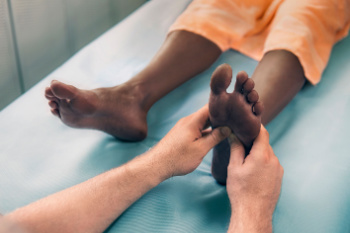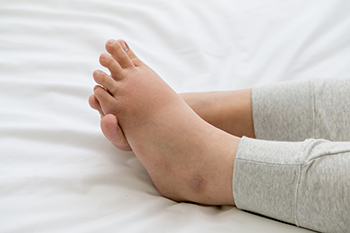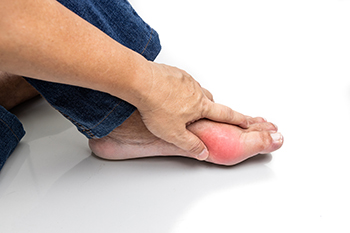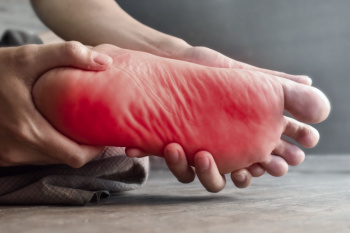Items filtered by date: February 2024
Foot Arthritis News

Foot arthritis is a common condition in older adults, but it has not been studied as much as arthritis in the knees or hands. Most studies focus on the big toe joint, but not much is known about arthritis in the middle of the foot. Approximately 17 percent of people over age 50 have foot arthritis that causes symptoms and is visible on X-rays. The big toe joint is usually affected the most, followed by other joints in the foot. There are several types of foot arthritis, including rheumatoid arthritis, osteoarthritis, and gout that require different treatments. Podiatrists may recommend wearing special shoes, custom-made orthotics, and sometimes surgery to help ease pain. If you have chronic foot pain, you may be suffering from a type of arthritis. It is suggested that you schedule an appointment with a podiatrist for an evaluation and determination of what the cause is, followed by obtaining proper treatment.
Arthritis can be a difficult condition to live with. If you are seeking treatment, contact Dr. Mark Gagnon from Advanced Podiatry. Our doctor can provide the care you need to keep you pain-free and on your feet.
Arthritic Foot Care
Arthritis is a joint disorder that involves the inflammation of different joints in your body, such as those in your feet. Arthritis is often caused by a degenerative joint disease and causes mild to severe pain in all affected areas. In addition to this, swelling and stiffness in the affected joints can also be a common symptom of arthritis.
In many cases, wearing ill-fitting shoes can worsen the effects and pain of arthritis. Wearing shoes that have a lower heel and extra room can help your feet feel more comfortable. In cases of rheumatoid arthritis, the arch in your foot may become problematic. Buying shoes with proper arch support that contour to your feet can help immensely.
Alleviating Arthritic Pain
- Exercises that stretch the foot can prevent further pain and injury and increase mobility
- Most of the pain can be alleviated with anti-inflammatory drugs, heat, and topical medications
- Massages can help temporarily alleviate pain.
It is best to see your doctor for the treatment that is right for your needs and symptoms. Conditions vary, and a podiatrist can help you determine the right method of care for your feet.
If you have any questions, please feel free to contact one of our offices located in Crestwood, Orland Park, and Summit, IL . We offer the newest diagnostic tools and technology to treat your foot and ankle needs.
Why Does Foot Swelling Occur During Pregnancy?

Foot swelling, or edema, is a common occurrence during pregnancy and can be attributed to various factors. As the body produces more blood and bodily fluids to support the developing fetus, the circulatory system experiences increased pressure, leading to fluid retention in the feet and ankles. Hormonal changes, specifically elevated levels of progesterone, contribute to the relaxation of blood vessels, causing them to dilate and allowing fluid to accumulate in the lower extremities. Additionally, the growing uterus puts pressure on the veins that return blood from the legs to the heart, further impeding circulation and exacerbating swelling. Prolonged standing or sitting, high ambient temperatures, and dietary factors like excessive salt intake can also exacerbate foot swelling at this time. If you are seeking relief options for your swollen feet during pregnancy, it is suggested that you consult a podiatrist who can offer you effective relief techniques.
Pregnant women with swollen feet can be treated with a variety of different methods that are readily available. For more information about other cures for swollen feet during pregnancy, consult with Dr. Mark Gagnon from Advanced Podiatry. Our doctor will attend to all of your foot and ankle needs.
What Foot Problems Can Arise During Pregnancy?
One problem that can occur is overpronation, which occurs when the arch of the foot flattens and tends to roll inward. This can cause pain and discomfort in your heels while you’re walking or even just standing up, trying to support your baby.
Another problem is edema, or swelling in the extremities. This often affects the feet during pregnancy but tends to occur in the later stages.
How Can I Keep My Feet Healthy During Pregnancy?
- Wearing orthotics can provide extra support for the feet and help distribute weight evenly
- Minimize the amount of time spent walking barefoot
- Wear shoes with good arch support
- Wear shoes that allow for good circulation to the feet
- Elevate feet if you experience swelling
- Massage your feet
- Get regular, light exercise, such as walking, to promote blood circulation to the feet
If you have any questions please feel free to contact one of our offices located in Crestwood, Orland Park, and Summit, IL . We offer the newest diagnostic and treatment technologies for all your foot and ankle needs.
Preventing Long-Term Joint Damage From Gout
 Besides the immediate discomfort of gout attacks, continuous and untreated gout attacks leave potential for joint damage. Gout is caused by elevated levels of uric acid in the body. The acid crystallizes and builds up in the joints, leading to painful episodes called gout attacks that often start in the big toe. Recurrent gout attacks can contribute to joint damage and deterioration over time. The repeated inflammatory responses within the joints can erode cartilage, the protective tissue that cushions the joints, and can cause irreversible damage. Untreated gout can also lead to the formation of tophi, lumps of uric acid crystals that accumulate in and around the joints. While usually painless, tophi can cause damage to the bone, pop up above the skin, and become infected. If you have gout or big toe pain, it is suggested you seek the help of a podiatrist who can develop a treatment plan that prevents long-term joint damage and preserves your joint health.
Besides the immediate discomfort of gout attacks, continuous and untreated gout attacks leave potential for joint damage. Gout is caused by elevated levels of uric acid in the body. The acid crystallizes and builds up in the joints, leading to painful episodes called gout attacks that often start in the big toe. Recurrent gout attacks can contribute to joint damage and deterioration over time. The repeated inflammatory responses within the joints can erode cartilage, the protective tissue that cushions the joints, and can cause irreversible damage. Untreated gout can also lead to the formation of tophi, lumps of uric acid crystals that accumulate in and around the joints. While usually painless, tophi can cause damage to the bone, pop up above the skin, and become infected. If you have gout or big toe pain, it is suggested you seek the help of a podiatrist who can develop a treatment plan that prevents long-term joint damage and preserves your joint health.
Gout is a painful condition that can be treated. If you are seeking treatment, contact Dr. Mark Gagnon from Advanced Podiatry. Our doctor will treat your foot and ankle needs.
What Is Gout?
Gout is a form of arthritis that is characterized by sudden, severe attacks of pain, redness, and tenderness in the joints. The condition usually affects the joint at the base of the big toe. A gout attack can occur at any random time, such as the middle of the night while you are asleep.
Symptoms
- Intense Joint Pain - Usually around the large joint of your big toe, and it most severe within the first four to twelve hours
- Lingering Discomfort - Joint discomfort may last from a few days to a few weeks
- Inflammation and Redness -Affected joints may become swollen, tender, warm and red
- Limited Range of Motion - May experience a decrease in joint mobility
Risk Factors
- Genetics - If family members have gout, you’re more likely to have it
- Medications - Diuretic medications can raise uric acid levels
- Gender/Age - Gout is more common in men until the age of 60. It is believed that estrogen protects women until that point
- Diet - Eating red meat and shellfish increases your risk
- Alcohol - Having more than two alcoholic drinks per day increases your risk
- Obesity - Obese people are at a higher risk for gout
Prior to visiting your podiatrist to receive treatment for gout, there are a few things you should do beforehand. If you have gout you should write down your symptoms--including when they started and how often you experience them, important medical information you may have, and any questions you may have. Writing down these three things will help your podiatrist in assessing your specific situation so that he or she may provide the best route of treatment for you.
If you have any questions, please feel free to contact one of our offices located in Crestwood, Orland Park, and Summit, IL . We offer the newest diagnostic and treatment technologies for all your foot care needs.
Common Symptoms of Neuropathy in the Feet

Neuropathy, a condition characterized by damage to the nerves, frequently manifests with distinct symptoms in the feet. Sensory disturbances are common, with individuals experiencing tingling or a sensation akin to pins and needles. Numbness is another hallmark symptom, contributing to a reduced ability to perceive temperature and touch. Many individuals with neuropathy report a burning or stabbing pain in their feet that often disrupts daily activities. Muscle weakness may accompany these sensations, leading to difficulties in maintaining balance and coordination. The symptoms of neuropathy can be progressive, and as the condition advances, individuals may face challenges with mobility and foot function. Early recognition of these common symptoms is important for timely diagnosis and intervention. If you have neuropathy that is affecting your feet, it is strongly suggested that you are under the care of a podiatrist who can guide you toward relief and management techniques.
Neuropathy
Neuropathy can be a potentially serious condition, especially if it is left undiagnosed. If you have any concerns that you may be experiencing nerve loss in your feet, consult with Dr. Mark Gagnon from Advanced Podiatry. Our doctor will assess your condition and provide you with quality foot and ankle treatment for neuropathy.
What Is Neuropathy?
Neuropathy is a condition that leads to damage to the nerves in the body. Peripheral neuropathy, or neuropathy that affects your peripheral nervous system, usually occurs in the feet. Neuropathy can be triggered by a number of different causes. Such causes include diabetes, infections, cancers, disorders, and toxic substances.
Symptoms of Neuropathy Include:
- Numbness
- Sensation loss
- Prickling and tingling sensations
- Throbbing, freezing, burning pains
- Muscle weakness
Those with diabetes are at serious risk due to being unable to feel an ulcer on their feet. Diabetics usually also suffer from poor blood circulation. This can lead to the wound not healing, infections occurring, and the limb may have to be amputated.
Treatment
To treat neuropathy in the foot, podiatrists will first diagnose the cause of the neuropathy. Figuring out the underlying cause of the neuropathy will allow the podiatrist to prescribe the best treatment, whether it be caused by diabetes, toxic substance exposure, infection, etc. If the nerve has not died, then it’s possible that sensation may be able to return to the foot.
Pain medication may be issued for pain. Electrical nerve stimulation can be used to stimulate nerves. If the neuropathy is caused from pressure on the nerves, then surgery may be necessary.
If you have any questions, please feel free to contact one of our offices located in Crestwood, Orland Park, and Summit, IL . We offer the newest diagnostic and treatment technologies for all your foot care needs.

